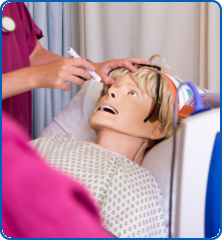Meeting an Anaesthetist in Maternity
Meeting an anaesthetist during your pregnancy and delivery
An anaesthetist is a fully qualified doctor with specialist training who you may meet at various points throughout your pregnancy and birth.
At the Antenatal clinic
You may be asked to come to the antenatal clinic to be reviewed by an anaesthetist if you have certain medial conditions which might make giving you an anaesthetic or pain relief more difficult. If so, you will meet a senior anaesthetist who will make a plan with you for your anaesthetic care during your birth. This will be documented in your maternity yellow notes.
You are also welcome to request an anaesthetic review if you have concerns regarding pain relief or anaesthesia that are not able to be answered by your midwife.
On the Delivery Suite
An anaesthetist is present on the delivery suite 24 hours a day. You will meet the anaesthetist if you would like an epidural for pain relief, who will discuss this in detail with you. [see also Pain Relief in Labour section].
Caesarean or assisted birth
If you require a caesarean birth or assisted birth (forceps or ventouse) in the operating theatre or another procedure in theatre you will be cared for by the anaesthetist.
The majority of women who need a procedure in theatre can have this done with a spinal or epidural anaesthetic which requires an injection in the back but allows you to remain awake.
Only occasionally is a general anaesthetic required. Before any procedure you will meet with the anaesthetist and discuss the planned anaesthetic.
On the Postnatal ward
If you have had any anaesthetic procedure then an anaesthetist will visit you on the postnatal ward the following day to ensure you have recovered from your anaesthetic. This may not be possible if you have an early discharge but the midwives will make sure there are no anaesthetic concerns before you go home. If you have any concerns after going home an anaesthetist can be contacted 24hrs a day via the Central Delivery Suite.
Acute illness
Anaesthetists may be involved in your care if you become unwell during your pregnancy or birth, for example with severe infection or bleeding. The anaesthetist is part of the team that will help look after you if this unlikely problem occurs.


